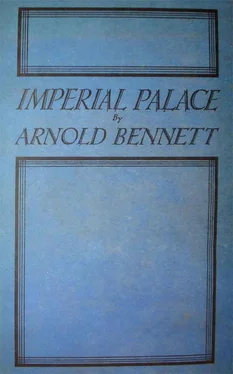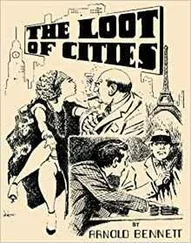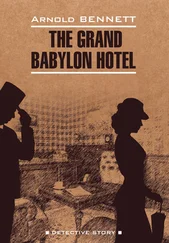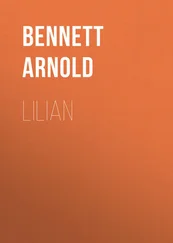Arnold Bennett - Imperial Palace
Здесь есть возможность читать онлайн «Arnold Bennett - Imperial Palace» — ознакомительный отрывок электронной книги совершенно бесплатно, а после прочтения отрывка купить полную версию. В некоторых случаях можно слушать аудио, скачать через торрент в формате fb2 и присутствует краткое содержание. Жанр: unrecognised, на английском языке. Описание произведения, (предисловие) а так же отзывы посетителей доступны на портале библиотеки ЛибКат.
- Название:Imperial Palace
- Автор:
- Жанр:
- Год:неизвестен
- ISBN:нет данных
- Рейтинг книги:4 / 5. Голосов: 1
-
Избранное:Добавить в избранное
- Отзывы:
-
Ваша оценка:
- 80
- 1
- 2
- 3
- 4
- 5
Imperial Palace: краткое содержание, описание и аннотация
Предлагаем к чтению аннотацию, описание, краткое содержание или предисловие (зависит от того, что написал сам автор книги «Imperial Palace»). Если вы не нашли необходимую информацию о книге — напишите в комментариях, мы постараемся отыскать её.
Imperial Palace — читать онлайн ознакомительный отрывок
Ниже представлен текст книги, разбитый по страницам. Система сохранения места последней прочитанной страницы, позволяет с удобством читать онлайн бесплатно книгу «Imperial Palace», без необходимости каждый раз заново искать на чём Вы остановились. Поставьте закладку, и сможете в любой момент перейти на страницу, на которой закончили чтение.
Интервал:
Закладка:
He was still the chemical engineer. He seldom mentioned sheets, chemises, collars, towels, stockings, and such-like common concrete phenomena. He would discourse upon the ‘surface tension’ of water, ‘breaking down,’ albumen, ‘Base Exchange,’ centrifugal cleansing, the sequence of waters, ‘residual alkalis,’ chlorine, warps and woofs, ‘efflorescence,’ etc., etc. He had established a research department, in which he was the sole worker.
As he deferentially shook hands with the great man his attitude said:
“Of course you are my emperor, but between ourselves I am as good as you, and you know it, and you know also that I have always delivered the goods.”
And yet somewhere behind Mr. Purkin’s shrewd little eyes there was something of the defensive as well as of the sturdy defiant, together with a glimmering of an uneasy consciousness that he had not always delivered the goods and that he too was imperfect—through no fault of his own.
“I must really show you this, sir,” said he, introducing Evelyn into the small managerial room where on the desk lay a pile of examination papers. “Question,” he read out, picking up a paper, “ ‘Why are white fabrics blued in order to procure a general appearance of whiteness?’ Answer: ‘White fabrics are blued because there are more yellow rays in the spectrum, and we use blue to counteract the yellow rays.’ Wouldn’t you say, sir, that that’s rather well and tersely put for a girl of sixteen and a half? These exam papers are useful as an index to character as well as to attainments.”
Evelyn heartily agreed, and for courtesy’s sake glanced at the paper.
“I see you’ve got all the painting finished,” said he. “Looks much better.”
“Ah!” replied Mr. Purkin. “Ah! I must show you one thing that I thought of. An idea I had, and I’ve carried it out.”
He drew Evelyn into the Laundry itself, walking with short, decided steps. They passed through two large and lofty interiors filled with machines and with uniformed girls (the girls did not all have their tea simultaneously), girls ironing, girls folding, girls carrying, girls sorting, amid steel in movement, heat, moisture, and a general gleaming whiteness. He halted, directing Evelyn’s attention to a row of pipes near the ceiling, painted in different colours.
“Red for hot water, blue for cold water, yellow for steam. The three primary colours. When a minor repair is necessary it isn’t always easy to tell at a glance everywhere which pipe is which. By this system you can’t make a mistake. Costs no more. I thought you’d approve.”
“Brilliant,” said Evelyn. “Brilliant. I congratulate you.” Possibly a trace of derision in Evelyn’s benevolent laudatory tone.
“And there’s the new drier,” Mr. Purkin continued, and led his chief to a room where two women, one mature, overblown and beautiful, and the other young but as plain as a suet pudding, were working in a temperature of 119 degrees. Evelyn had to admire and marvel again. Nor was that the end of the tour of novelties. Mr. Purkin’s ingenuity and his passion for improvements were endless. And as Evelyn went from table to table and from machine to machine and from group to group of girls, busy either individually or in concert, and from pile to growing or lessening pile of linen, and as he sought for the private lives and the characters of girls in the lowered, intent faces of girls, he sardonically thought: “This chap is putting off the fatal moment on purpose. And doing it very well too. Creating all this atmosphere of approval. Damn clever fellow! Pity he isn’t clever enough to see that I can see through him.”
But, back in Mr. Purkin’s prim, stuffy, excessively neat little office, the Midlander boldly summoned the moment.
“I’m glad you were able to come to-day, sir, because I was getting anxious for you to see for yourself we aren’t standing still here. I know you’re always interested, very interested, but we like to see you here, all of ’em like to see you. It makes us all feel that we kind of ‘belong.’ . . . Oh! Upon my word, I was forgetting to tell you that the number of pieces from private customers passed the twenty thousand mark last week—at last. You’ll receive the figures to-morrow.”
“Good! Good! You always said it would.”
“But there was another thing I wanted to see you about.”
“Oh!” Evelyn exclaimed, feigning ignorance.
“Yes. About those frilled dress-shirts last Thursday.”
“Oh! That!”
“Yes,” continued Mr. Purkin. “Yes, sir. You may have forgotten, but I can assure you that I haven’t.”
Now the affair of the frilled shirts was one of those molehills which are really mountains. In a few hours it had swollen itself into a Mont Blanc. A guest who was a public character and who had been staying at the Palace for weeks and spending quite a lot of money, had complained about the ironing of his frilled evening shirts. Mrs. O’Riordan herself had taken the matter up. Mrs. O’Riordan had given her word that the frilled shirts should be ironed to the owner’s satisfaction, and at the end of ten days Mrs. O’Riordan had redeemed her word. Triumph for the hotel. Smiles from the guest. And for Mr. Immerson, the hotel’s Publicity-manager, material for one or two piquant newspaper paragraphs. On the last day of his sojourn the guest had reached the state of being convinced that his celebrated frilled shirts had never been so perfectly done before. No laundry like the Imperial Palace Hotel Laundry! His desire was to leave the Palace with the largest possible stock of frilled shirts ironed by its Laundry. “Can I rely on having these three shirts back to-night?” he had asked. Of course! Could he doubt it? Was it not a basic principle of the Laundry that all linen consigned in the morning was delivered absolutely without fail the same evening? It was.
But the unique shirts had not been delivered, and the next morning the guest, disillusioned, wounded, inconsolable, had had to depart without them. A child disappointed of a promised toy, a religionist whose faith has been suddenly struck from under him, could not have exhibited more woe than the deceived guest. True, the shirts were sent after him by air-mail to Paris and got there first. But inefficiency remained inefficiency; and the Laundry’s lapse had shocked every housekeeper at the Palace. The foundations of the Palace had for an instant trembled. The unimaginative individuals who snorted that three shirts ought not to be enough to shake the foundations of a nine-storey building simply did not understand that such edifices as the Imperial Palace were not built with hands.
Evelyn had by no means forgotten the affair. A minor purpose of his visit to Kennington had indeed been to get to the bottom of it. He knew that Mr. Purkin guessed this, and that Mr. Purkin knew that Evelyn knew that he guessed. Nevertheless the two men continued to pretend.
“I was under the impression that it had been explained,” said Evelyn. “You had only one girl who specialised in these preposterous shirts, and she was taken ill or something at the very moment when your need of her was most desperate.”
“No, sir,” said Mr. Purkin with brave candour, “the matter has not been explained—to you; at least not satisfactorily. The girl, Rose, was not taken ill. She merely walked out and left us in the lurch. We have the best class of girls here. I remember when laundry staffs had to be recruited from riff-raff. We’ve altered all that, by improving the conditions. I knew Rose; I thought highly of her; I knew her father, a house-painter, most respectable. And yet she walks out! She’ll never walk in again, I may say, not as long as I’m manager here. Naturally I got the shirts done, in a way, next morning. But that’s not the point.”
Читать дальшеИнтервал:
Закладка:
Похожие книги на «Imperial Palace»
Представляем Вашему вниманию похожие книги на «Imperial Palace» списком для выбора. Мы отобрали схожую по названию и смыслу литературу в надежде предоставить читателям больше вариантов отыскать новые, интересные, ещё непрочитанные произведения.
Обсуждение, отзывы о книге «Imperial Palace» и просто собственные мнения читателей. Оставьте ваши комментарии, напишите, что Вы думаете о произведении, его смысле или главных героях. Укажите что конкретно понравилось, а что нет, и почему Вы так считаете.












